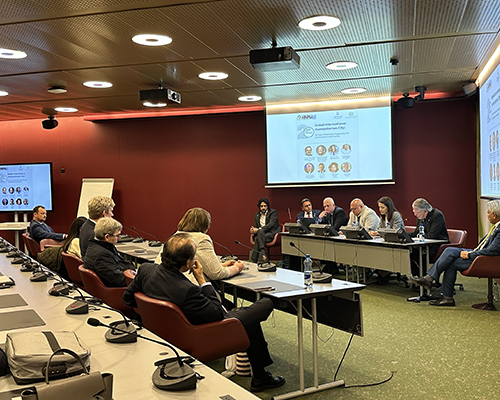
26 April 2023 – Dubai, United Arab Emirates – The International Humanitarian City (IHC) organized a panel discussion to showcase the success and impact of IHC over the past 20 years in supporting the global humanitarian community. The event was held during the Humanitarian Networks and Partnerships Weeks (HNPW 2023) in Geneva.
Established in 2003, the IHC has played a significant role in facilitating the delivery of aid and relief, enhancing emergency preparedness, promoting partnerships to find sustainable solutions to challenges in the humanitarian logistics field, and serving millions of people around the world.
In the opening remarks, HE Ambassador Ahmed Al Jarman, UAE Permanent Representative to the UN in Geneva, highlighted the committed role of the UAE and Dubai in supporting the global humanitarian community and its commitment to proactively addressing humanitarian challenges.
“The IHC is one of the important icons of the humanitarian work that marks the involvement of the United Arab Emirates in this field which is considered a fundamental pillar of the charitable approach adopted by the state since its establishment. And I confirm the willingness of the UAE to reinforce the IHC to be a leading Global Humanitarian Hub,” he said. His Excellency Al Jarman added that COP 28, which will be held in Dubai in November, will also offer a suitable platform to discuss and address the impact of climate change on humanitarian issues, including the tools and infrastructure that should support all stakeholders.
IHC CEO Giuseppe Saba echoed these sentiments in his closing remarks, noting that “the IHC has evolved into a dynamic and innovative platform that supports the global humanitarian community. We are committed to continuing to proactively enhance humanitarian emergency preparedness and response, innovation, and sustainability. We look forward to continuing to work together with our partners and stakeholders to shape the future of humanitarian action.”
The panel discussion was moderated by HE Ambassador Gerhard Putman-Cramer, PAM Permanent Observer to the UN Geneva, and CEO of DIHAD Foundation (Dubai International Humanitarian Aid and Development).
The session covered the history and evolution of the IHC, including its key milestones and achievements. It also tackled the role of the IHC in facilitating the delivery of humanitarian aid and emergency relief, the challenges it faced in responding to emergencies, including the COVID-19 pandemic, and how it has adapted to meet these challenges.
The panelists then discussed their vision of the future for IHC and its ongoing mission to connect humanitarian hubs and cities to support the humanitarian community’s efforts in emergency preparedness and response, innovation, and sustainability. They included Nadia Jbour, former Head of UNHCR Office in UAE, Mario Stephan, former Executive Director of Doctors Without Borders in UAE (MSF), Paul Molinaro, Director of Strategic Health Operations at the World Health Organization (WHO), Simon Missiri, Director of Logistics for the International Federation of Red Cross and Red Crescent Societies (IFRC), Walid Ibrahim, WFP-UNHRD Network Coordinator, and Giuseppe Saba, CEO of the Dubai International Humanitarian City.
The IHC also organized another session during the HNPW, bringing around the table all actors and stakeholders involved in emergency response to showcase key digital platforms relevant to relief stocks, starting with the national disaster management bodies and including humanitarian workers, the private sector, and customs government entities. The participants ran a simulation exercise for a more sustainable and comprehensive humanitarian response, highlighting the impact of digitalization.